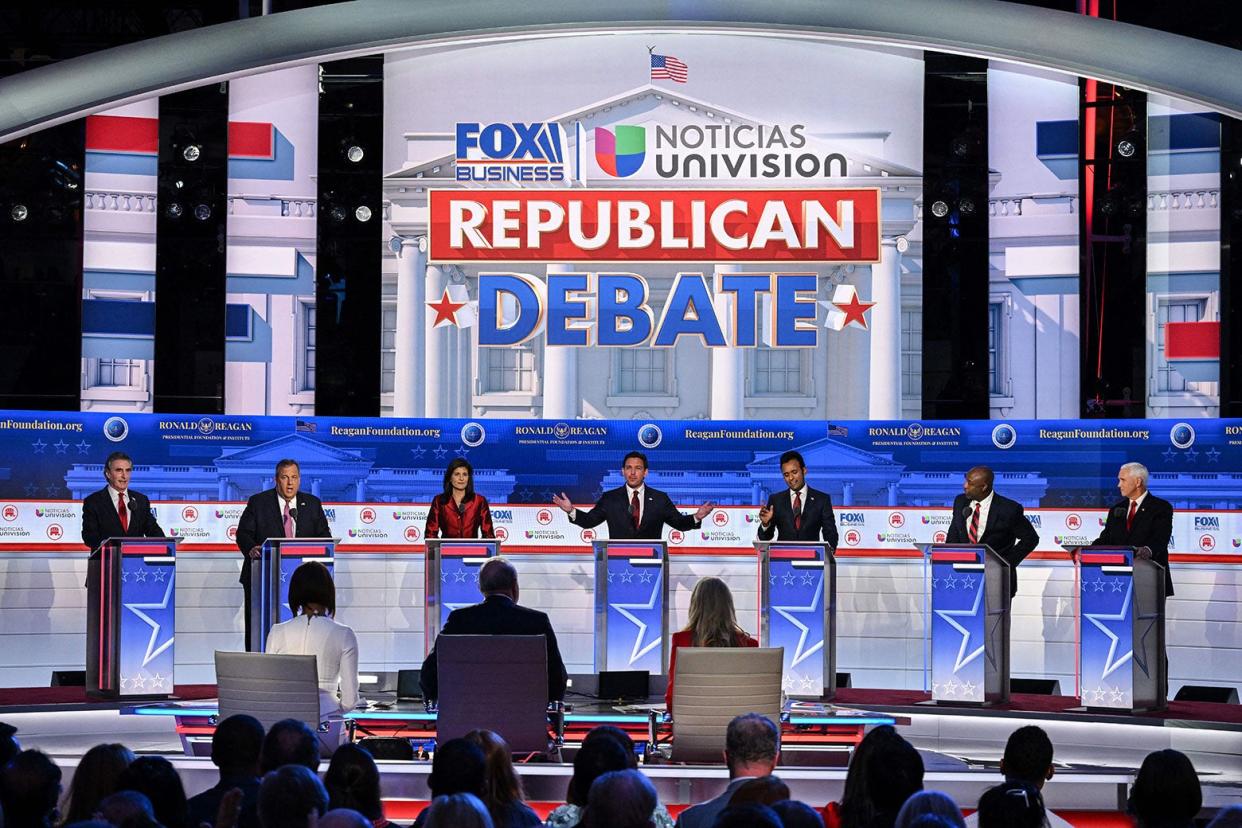The Most Important Debate Question That Wasn’t Asked

- Oops!Something went wrong.Please try again later.
Wednesday’s Republican presidential debate featured plenty of good questions about real policy problems that went unanswered, as well as plenty of talk by the candidates about far-fetched hypothetical policies that would almost certainly never come to pass (in part, of course, because no one on that stage is really even in the running to be president).
But the single most Republican policy question was never asked at all: How much do you intend to cut taxes for large corporations and the rich?
Because for all the bluster about disbanding federal agencies, deporting American citizens, sticking it to trans youth, and busting up unions large and small, the actual Republican list of priorities begins with cutting taxes—and when it comes to legislation, may ultimately end there as well.
This is in part because of the huge successes of the Republican Party over the past few decades.
They’ve won and implemented so much, their wish list is dwindling (with the exception of simply destroying the federal government but simultaneously enacting new and increasingly draconian attacks on civil liberties). The courts are already packed for a generation, and the GOP can rely on the captured judiciary to implement the most unpopular parts of its program on abortion, voter disenfranchisement, the gutting of environmental regulations, and more.
In the age of the filibuster, any presidency will feature maybe two large pieces of legislation, and the Trump administration is instructive here. When Donald Trump won in 2016, he pledged to cut taxes on the rich and repeal Obamacare. He passed a giant, exceedingly unpopular tax cut along those lines and then failed to win an Obamacare repeal, because kicking millions of people off of their health care was even more unpopular and frankly too much to pull off. That second plank of the Republican agenda seems to be dead: There’s a reason Mike Pence refused to answer the question Wednesday night, at point blank range, when asked if Obamacare repeal would ever happen, and a reason no other Republican dove in to snatch the question from him.
Trump’s Republican predecessor, George W. Bush, wasn’t terribly different. He passed some major War on Terror–related restrictions on American rights and civil liberties, and had two full terms to do it, but arguably his biggest legislative feat was also a giant tax cut for the rich and corporations.
Republican presidents cut taxes on the rich and corporations—that is guaranteed to be the legislative bulk of any Republican presidency; the only question is how and by how much. Trump has actually produced a work-up. As the Washington Post reported, the front-runner is seeking “deeper cuts to both individual and corporate tax rates that would build on his controversial 2017 tax law … potentially to as low as 15 percent.” Trump’s first tax bill cut corporate taxes from 35 to 21 percent.
Tax cuts did get mentioned Wednesday night, in the midst of blind paeans to Ronald Reagan and rants about inflation. Nikki Haley, for instance, mentioned that her solution to inflation was to cut taxes on the middle class, among various other things. In the same breath, she pledged to take on the state and local tax deduction, which was already reduced dramatically by the Trump Tax Cuts and Jobs Act. Making matters more confusing, the SALT deduction was effectively a tax cut for the rich (in Democratic states with higher state taxes) that Trump got rid of.
Each candidate seems eager to prove to Republican voters that he or she will find his or her own flavor of cruelty to visit upon migrants, queer people, and teachers. And of course, whoever wins on the Republican side will also likely pursue some version of a national abortion ban. But the field seems to have sworn a pact not to speak of that too loudly given how loathed it is by voters. Still, helping the rich get richer remains a core concern of the Republican agenda, and the moderators, overmatched though they were by the endless cross-talk, should have at least asked.
The anchors from Fox Business, of all places, surely were aware of the salience of tax cuts, which is one of the few areas where the candidates might have had a difference of opinion. Who’s cutting income tax to zero? Who wants to do away with inheritance tax? The problem, of course, is that the Republican agenda is extremely unpopular, and getting granular on how you want to do upward redistribution doesn’t help. But that none of them had to articulate their position on taxes—or abortion bans, for that matter—made the whole exercise meaningless.

